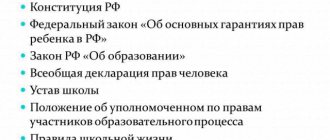What administrative penalties can be applied to parents?
Commissions for minors may apply administrative measures to parents (issue a warning, impose an obligation to make amends for the harm caused, or impose a fine):
- in case of failure of parents to fulfill their responsibilities for raising and educating children;
- for involving them in drinking alcohol or using drugs;
- for appearing in public places while intoxicated or drinking beer or alcohol in public places by teenagers under 16 years of age.
What are the consequences of poor performance?
Those parents who improperly fulfill their duties in relation to children under 18 years of age are subject to administrative punishment (Part 1 of Article 5.35 of the Code of Administrative Offenses of the Russian Federation). This is a warning or a fine, but this is only the first time.
If the failure to fulfill parental duty is aggravated by cruelty, then the punishment is more serious , this is a criminal punishment (Article 156 of the Criminal Code of the Russian Federation) in the form of a very large fine, or a mandatory period of up to 440 hours, or up to 3 years of forced labor.
In the presence of a set of grounds, manifested in a whole complex of unfulfilled debts to children , complicated by criminal intentional harm to the health of a minor child, his parents are deprived of parental rights (Article 69 of the RF IC).
A decision may be made to limit the rights of parents (Article 73, paragraph 2), when the life or upbringing of a child is truly threatened by the behavior of the mother or father .
In what cases are parents held criminally responsible?
The Criminal Code of the Russian Federation provides for special rules on the criminal liability of parents:
- for involving minor children in committing a crime through promises, deception, threats or in any other way;
- for involving a minor in the systematic use of alcoholic beverages and intoxicating substances;
- for involvement in prostitution, vagrancy or begging;
- for failure to fulfill or improper fulfillment of responsibilities for raising children, if these acts are associated with cruel treatment;
- for malicious evasion of payment of child support.
Failure to fulfill parental responsibilities
The lion's share of families fulfills their responsibilities towards children in accordance with their own ideas about the upbringing and education of children. That is why not everyone and does not always do everything properly .
Responsibilities are considered unfulfilled or not fully fulfilled if minor children:
- do not regularly attend school classes;
- they use foul language and do not know how to behave;
- they steal, beg , wander;
- drink alcohol, or even drugs , etc.
A child whose father, mother or both parents do not devote time to, and who is not engaged with, immediately finds something to fill the hours of inactivity, and her careless “ancestors” may be subject to punishment .
Who is responsible for harm caused by a child under 14 years of age?
Parents, unless they prove that the harm was not their fault. If at the time of the harm the minor was under the supervision of a school, hospital, health camp, etc., the institution will be responsible for the harm unless it proves that the harm was not its fault. But if the parents do not have sufficient funds to compensate for the harm, and the offender himself, having become legally capable, has such funds, the court has the right to demand compensation for the harm from the one who caused it.
Parents also bear property liability for transactions involving young children (under 14 years of age).
New “Law on Education”
What concerns the education of children is clearly stated in the new Law of the Russian Federation “On Education” of 2015 No. 273-FZ (adopted on December 21, 2012), which also covers the responsibilities of parents in the educational field.
In addition to choosing an educational institution, form of education, national and foreign language, the parent must be interested in curriculum and teaching methods .
Attending various medical and psychological examinations of the child is the right of parents, as well as protecting the interests of their minor offspring. But compliance with various rules, regimes and procedures of the educational institution is the responsibility of parents .
Parents are obliged to take an active part in resolving all disputes and conflicts in an educational institution with the participation of their children , not to leave things to chance and not to lead the situation to the intervention of guardianship authorities, especially law enforcement agencies.
What rights does a father have after a family breakdown?
In Russia, especially if a child is under 3 years old, when spouses divorce, in 95% of cases the child remains with the mother. But the rights and responsibilities of the father after a divorce are not limited. According to Art. 66 of the RF IC, he is responsible for raising children. His rights:
- know in full information about the child, regarding his health, both physical and mental, about his progress at school, monitor the results of his studies, take children to sports sections, various clubs;
- represent the interests of a minor in various authorities;
- to allow or not to allow the child to change his surname;
- prohibit the travel of a minor child abroad to another country;
- have unlimited communication with the child.
By mutual agreement, parents enter into an agreement on when and how they will spend the hours allotted for communication with their baby. The wife has no right to prevent meetings with the other parent.
If an independent agreement on how to raise children and communicate with them cannot be reached, then the father sends a petition to the court.
The legislation provides that none of the parents are limited in these rights, otherwise the interests of the adult and minor child will be infringed.
Chapter 1
Chapter 2
Chapter 3
Chapter 4
Chapter 5
Article 1. Subject of regulation of this Federal Law
Article 2. Basic concepts used in this Federal Law
Article 3. Basic principles of state policy and legal regulation of relations in the field of education
Article 4. Legal regulation of relations in the field of education
Article 5. Right to education. State guarantees of the realization of the right to education in the Russian Federation
Article 6. Powers of federal government bodies in the field of education
Article 7. The powers of the Russian Federation in the field of education, transferred for implementation to state authorities of the constituent entities of the Russian Federation
Article 8. Powers of state authorities of the constituent entities of the Russian Federation in the field of education
Article 9. Powers of local government bodies of municipal districts and city districts in the field of education
Article 10. Structure of the education system
Article 1. Subject of regulation of this Federal Law
Article 2. Basic concepts used in this Federal Law
Article 3. Basic principles of state policy and legal regulation of relations in the field of education
Article 4. Legal regulation of relations in the field of education
Article 5. Right to education. State guarantees of the realization of the right to education in the Russian Federation
Article 6. Powers of federal government bodies in the field of education
Article 7. The powers of the Russian Federation in the field of education, transferred for implementation to state authorities of the constituent entities of the Russian Federation
Article 8. Powers of state authorities of the constituent entities of the Russian Federation in the field of education
Article 9. Powers of local government bodies of municipal districts and city districts in the field of education
Article 10. Structure of the education system
Article 1. Subject of regulation of this Federal Law
Article 2. Basic concepts used in this Federal Law
Article 3. Basic principles of state policy and legal regulation of relations in the field of education
Article 4. Legal regulation of relations in the field of education
Article 5. Right to education. State guarantees of the realization of the right to education in the Russian Federation
Article 6. Powers of federal government bodies in the field of education
Article 7. The powers of the Russian Federation in the field of education, transferred for implementation to state authorities of the constituent entities of the Russian Federation
Article 8. Powers of state authorities of the constituent entities of the Russian Federation in the field of education
Article 9. Powers of local government bodies of municipal districts and city districts in the field of education
Article 10. Structure of the education system
Article 1. Subject of regulation of this Federal Law
Article 2. Basic concepts used in this Federal Law
Article 3. Basic principles of state policy and legal regulation of relations in the field of education
Article 4. Legal regulation of relations in the field of education
Article 5. Right to education. State guarantees of the realization of the right to education in the Russian Federation
Article 6. Powers of federal government bodies in the field of education
Article 7. The powers of the Russian Federation in the field of education, transferred for implementation to state authorities of the constituent entities of the Russian Federation
Article 8. Powers of state authorities of the constituent entities of the Russian Federation in the field of education
Article 9. Powers of local government bodies of municipal districts and city districts in the field of education
Article 10. Structure of the education system
Article 11. Federal state educational standards and federal state requirements. Educational standards
Article 12. Educational programs
Article 13. General requirements for the implementation of educational programs
Article 14. Language of education
Article 15. Network form of implementation of educational programs
Article 16. Implementation of educational programs using e-learning and distance learning technologies
Article 17. Forms of education and forms of training
Article 18. Printed and electronic educational and information resources
Article 19. Scientific, methodological and resource support for the education system
Article 20. Experimental and innovative activities in the field of education
Article 21. Educational activities
Article 22. Creation, reorganization, liquidation of educational organizations
Article 23. Types of educational organizations
Article 24. Moscow State University named after M.V. Lomonosov, St. Petersburg State University. Categories of educational organizations of higher education
Article 25. Charter of an educational organization
Article 26. Management of an educational organization
Article 27. Structure of an educational organization
Article 28. Competence, rights, duties and responsibilities of an educational organization
Article 29. Information openness of an educational organization
Article 30. Local regulations containing norms regulating educational relations
Article 31. Organizations providing training
Article 32. Individual entrepreneurs carrying out educational activities
Article 33. Students
Article 34. Basic rights of students and measures of their social support and incentives
Article 35. Use of textbooks, teaching aids, teaching and educational means
Article 36. Scholarships and other monetary payments
Article 37. Catering for students
Article 38. Students’ clothing. Uniforms and other clothing (uniforms) of students
Article 39. Provision of residential premises in dormitories
Article 40. Transport support
Article 41. Health protection of students
Article 42. Psychological, pedagogical, medical and social assistance to students experiencing difficulties in mastering basic general education programs, development and social adaptation
Article 43. Duties and responsibilities of students
Article 44. Rights, duties and responsibilities in the field of education of parents (legal representatives) of minor students
Article 45. Protection of the rights of students, parents (legal representatives) of minor students
Article 46. The right to engage in teaching activities
Article 47. Legal status of teaching staff. Rights and freedoms of teaching staff, guarantees of their implementation
Article 48. Duties and responsibilities of teaching staff
Article 49. Certification of teaching staff
Article 50. Scientific and pedagogical workers
Article 51. Legal status of the head of an educational organization. President of an educational organization of higher education
Article 52. Other employees of educational organizations
Article 11. Federal state educational standards and federal state requirements. Educational standards
Article 12. Educational programs
Article 13. General requirements for the implementation of educational programs
Article 14. Language of education
Article 15. Network form of implementation of educational programs
Article 16. Implementation of educational programs using e-learning and distance learning technologies
Article 17. Forms of education and forms of training
Article 18. Printed and electronic educational and information resources
Article 19. Scientific, methodological and resource support for the education system
Article 20. Experimental and innovative activities in the field of education
Article 21. Educational activities
Article 22. Creation, reorganization, liquidation of educational organizations
Article 23. Types of educational organizations
Article 24. Moscow State University named after M.V. Lomonosov, St. Petersburg State University. Categories of educational organizations of higher education
Article 25. Charter of an educational organization
Article 26. Management of an educational organization
Article 27. Structure of an educational organization
Article 28. Competence, rights, duties and responsibilities of an educational organization
Article 29. Information openness of an educational organization
Article 30. Local regulations containing norms regulating educational relations
Article 31. Organizations providing training
Article 32. Individual entrepreneurs carrying out educational activities
Article 33. Students
Article 34. Basic rights of students and measures of their social support and incentives
Article 35. Use of textbooks, teaching aids, teaching and educational means
Article 36. Scholarships and other monetary payments
Article 37. Catering for students
Article 38. Students’ clothing. Uniforms and other clothing (uniforms) of students
Article 39. Provision of residential premises in dormitories
Article 40. Transport support
Article 41. Health protection of students
Article 42. Psychological, pedagogical, medical and social assistance to students experiencing difficulties in mastering basic general education programs, development and social adaptation
Article 43. Duties and responsibilities of students
Article 44. Rights, duties and responsibilities in the field of education of parents (legal representatives) of minor students
Article 45. Protection of the rights of students, parents (legal representatives) of minor students
Article 46. The right to engage in teaching activities
Article 47. Legal status of teaching staff. Rights and freedoms of teaching staff, guarantees of their implementation
Article 48. Duties and responsibilities of teaching staff
Article 49. Certification of teaching staff
Article 50. Scientific and pedagogical workers
Article 51. Legal status of the head of an educational organization. President of an educational organization of higher education
Article 52. Other employees of educational organizations
Article 11. Federal state educational standards and federal state requirements. Educational standards
Article 12. Educational programs
Article 13. General requirements for the implementation of educational programs
Article 14. Language of education
Article 15. Network form of implementation of educational programs
Article 16. Implementation of educational programs using e-learning and distance learning technologies
Article 17. Forms of education and forms of training
Article 18. Printed and electronic educational and information resources
Article 19. Scientific, methodological and resource support for the education system
Article 20. Experimental and innovative activities in the field of education
Article 21. Educational activities
Article 22. Creation, reorganization, liquidation of educational organizations
Article 23. Types of educational organizations
Article 24. Moscow State University named after M.V. Lomonosov, St. Petersburg State University. Categories of educational organizations of higher education
Article 25. Charter of an educational organization
Article 26. Management of an educational organization
Article 27. Structure of an educational organization
Article 28. Competence, rights, duties and responsibilities of an educational organization
Article 29. Information openness of an educational organization
Article 30. Local regulations containing norms regulating educational relations
Article 31. Organizations providing training
Materials 1 - 150 of 475 Home |
Prev. | 1
| Track. | End | All
Responsibilities of a Divorced Father
If the parents are divorced or the father lives separately, his main responsibility is to pay alimony to his offspring. In addition, the rights of the father to the child are as follows:
- take part in upbringing, communicate with your children, the exception is the restriction of the functions of an adult, which is imposed by the court;
- contact with the ex-wife to make the right decisions about the fate of their child, his vote has the same right as the mother of the baby;
- provide assistance in difficult situations: material, physical, psychological;
- help obtain secondary education: partially pay the costs of educating children in a fee-paying school, buy supplies and uniforms;
- It is mandatory to compensate 50% of the funds spent by the mother on the treatment of the child.
How is child support determined?
In the event of a family breakdown, the father is assigned to pay child support to his ex-wife until they reach adulthood. The procedure can be performed:
- voluntarily, upon the conclusion of an agreement by the spouses in the past, indicating a certain amount of payments, and when the teenager reaches 14 years of age, he has the right to obtain the consent of the father himself;
- when applying to judicial authorities.
The amount of child support is fixed when the father:
- individual entrepreneur;
- without a permanent job;
- receives funds not from salary, but in other ways: fees, royalties, investment activities.
It is also possible to make a lump sum payment or transfer valuable property. In both cases, the value of the transferred assets must correspond to the total minimum value of monthly alimony established by law for the period until the child reaches the age of majority.
According to the law, the percentage of alimony from a dad’s salary is affected by the number of his children:
- if there is only one child – 25%;
- if two – 33%;
- if three or more – 50%.
The amount is withheld by the accounting department of the organization where the ex-husband works. If he changes his place of work, he must inform his employer so that alimony is calculated from him. If the salary decreases, the man has the right to legally demand a reduction in the previously established amount of payments for children, and if the salary has increased, the mother will be able to insist on an increase in alimony. In this case, she has the right to submit an application to the judicial authorities at her place of residence or contact bailiffs to review the amount of alimony.
The father pays the money whether the ex-wife got married after divorcing him or not, whether the child has an urgent need for money. The loss of ability to work of the former spouse is not taken into account. Minor and adult fathers have the same responsibilities and rights regarding a child during a divorce.








